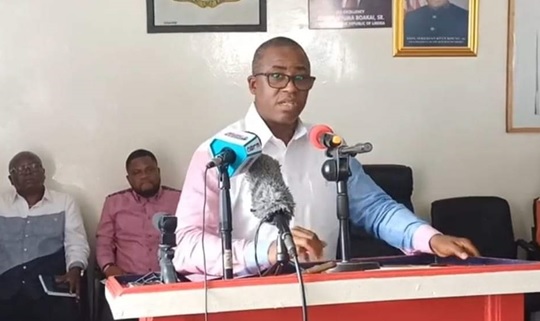President Joseph Boakai’s administration is facing significant criticism for its apparent lapses in transparency and accountability, raising concerns that his leadership may be following the same troubling trajectory as the previous regime. Boakai’s actions have increasingly drawn parallels to the former ruling Coalition for Democratic Change (CDC) under former President George Weah, leading many to question his commitment to the promises of reform and openness that he campaigned on.
Boakai, who assumed office with a pledge to usher in a new era of transparency, has recently been accused of failing to deliver on these commitments. One of the most glaring issues is his administration’s handling of the National Security Agency (NSA) budget. Despite pledging to audit the NSA, Boakai later retracted this decision, citing the “sensitivity of operations” as a reason. Critics argue that this move undermines the very essence of accountability and raises suspicions about what might be hidden behind the veil of “sensitive operations.”
This decision has not only tarnished Boakai’s image but also fueled accusations that his administration is no different from Weah’s, which was widely criticized for its lack of transparency and alleged corruption. Under Weah’s leadership, the NSA was allocated substantial funds, often without clear accountability. Boakai’s initial promise to audit the NSA seemed like a step in the right direction, but his subsequent reversal has been seen as a significant setback.
The lack of transparency extends beyond the NSA issue. The delayed publication of the 2024 national budget has also been a point of contention. Although the budget was signed and printed into handbill, it has not been made publicly accessible as required by law. This delay has sparked widespread frustration and skepticism, with many citizens and civil society groups demanding to know why the approved budget remains out of reach.
Boakai’s approach to governance, critics argue, mirrors the “business as usual” practices of his predecessors. This phrase, often used to describe the continuation of entrenched and corrupt systems, has become a rallying cry for those disappointed by the lack of substantial change. The promise of a new direction, symbolized by Boakai’s campaign rhetoric, now seems increasingly hollow as his administration fails to distinguish itself from the previous regime.
Moreover, Boakai’s budgetary priorities have come under fire. The NSA’s budget allocation for 2024 far exceeds that of crucial sectors like agriculture, which received a paltry sum in comparison. This misallocation of resources is seen as a stark indicator that Boakai’s government is not prioritizing the development needs of the country. The emphasis on funding the NSA, despite Liberia’s low threat level on the Global Terrorism Index, suggests a misalignment of national priorities.
In conclusion, President Joseph Boakai’s administration is at a critical juncture. The initial optimism that greeted his tenure is rapidly giving way to disillusionment as his actions increasingly mirror the opacity and mismanagement of the past. To regain public trust, Boakai must take decisive steps to fulfill his promises of transparency and accountability. This includes recommissioning the NSA audit, ensuring timely publication of the national budget, and realigning budgetary priorities to reflect the needs of the people. Without such measures, Boakai risks being remembered not as the leader who brought change, but as one who perpetuated the status quo.







